The tentative contract agreement reached after an around-the-clock bargaining session that concluded on June 16 contains significant improvements to the PSC’s contract with CUNY, including multiyear appointments for long-serving adjuncts, a commitment to a reduction in teaching load for full-time faculty and gains for HEOs and library faculty. In addition, the union won retroactive raises dating back to 2012, for a total 10.4 percent increase. Here, members of the bargaining team reflect on the victories achieved in the deal and the work yet to be done. Other bargaining team members include Bob Cermele, Iris DeLutro, Arthurine DeSola, Anne Friedman, Steve London, Marcia Newfield, Costas Panayotakis and Barbara Bowen, the chief negotiator. Susan DiRaimo and Alex Vitale served as nonvoting members.
Back Pay
Mike Fabricant
PSC First Vice President
Professor, Silberman School of Social Work
Hunter College
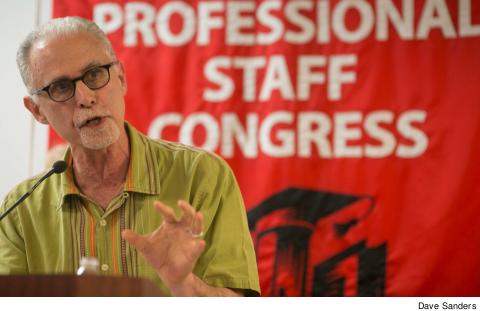
One of the most contested demands of the contract campaign revolved around retroactive cash due to PSC members. Despite intense resistance in Albany, the issue gained significant political traction during the course of the PSC contract campaign. In the winter of 2016, as the campaign escalated, Governor Andrew Cuomo acknowledged the legitimacy of the PSC claim when he linked a proposed $485 million cut to CUNY with a $240 million initiative to cover back pay. Because of the growing power of the contract campaign, the $485 million cut disappeared even as the PSC figure of $240 million owed to members received sustained support by the legislature and was eventually approved by the governor.
________________________________________________
Sharon Persinger
PSC Treasurer
Associate Professor, Department of Mathematics
Bronx Community College
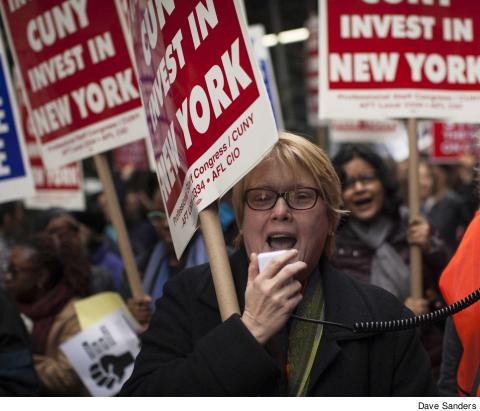
There are a lot of things to be proud of in this agreement, and retroactive pay has to be one of them, given the resistance we met from CUNY and New York State until the very end of negotiations. Under the tentative contract agreement, a full-time member of the bargaining unit who earned $100,000 in 2012 will be due more than $18,000 in retroactive pay by October 20, 2016. This estimate doesn’t take into account the effect of step increases, which could increase the amount. CUNY’s original financial offer would have resulted in less than $5,500 in retroactive pay for this member at that time. As a result of organizing our members, our students and the community, and because of our meetings, rallies, lobbying and civil disobedience and media work, we will receive more than three times the amount of back pay that was in the original offer. I’m voting YES to ratify this contract and claim that win.
________________________________________________
Multiyear Adjunct Appointments
Michael Batson
Adjunct Lecturer
Department of History
College of Staten Island
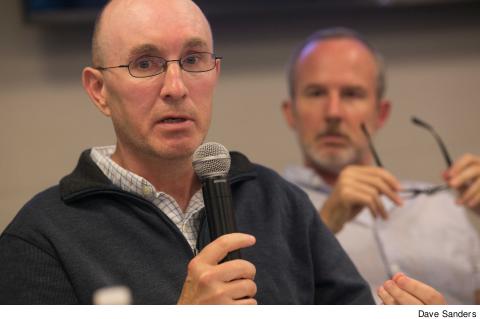
Back in 2010, the union began soliciting input from members for what they wanted in the new contract. Not surprisingly, adjuncts repeatedly demanded greater security and equity. The multiyear appointments in the proposed contract – like nearly all the demands – are the result of intense negotiations at the bargaining table between two sides with very different visions for CUNY: one side looking for greater contingency, and the other looking to curtail it. But make no mistake, the multiyear appointments represent a structural change for adjuncts.
A large number of long-serving adjuncts will immediately be granted appointments that will relieve them of semester-by-semester anxiety, and going forward, greater numbers will qualify. Most importantly, this step away from contingency gives us a strong base on which to build when we begin bargaining for subsequent contracts. In addition, the demand for equity was partially met with the negotiation for adjunct health care. Clearly, there is much work left to do, but this round represents significant progress for adjuncts at CUNY.
________________________________________________
Blanca Vázquez
Adjunct Assistant Professor
Film and Media Department
Hunter College
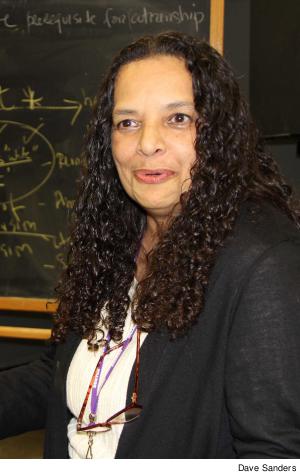
The three-year adjunct contract is an important structural change. It acknowledges that adjuncts are a core part of CUNY’s teaching faculty and not provisional workers serving at management’s pleasure. It guarantees those on multiyear appointments six credits per semester (or compensation if six credits are not available) and allows us to accumulate sick leave over the three-year period. It will have a major impact in our departments, allowing for better long-term planning, coordination and integration of full- and part-time faculty. It is up to all of us to make sure it’s implemented well as we build on this achievement in the next contract fight.
________________________________________________
Teaching Load
Lorraine Cohen
Professor
Social Science Department
LaGuardia Community College
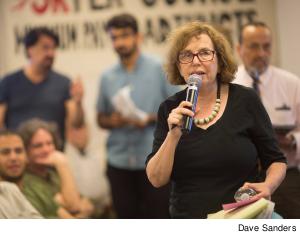
One of the most important breakthroughs in this contract is the statement on teaching load. For the first time since I have been a faculty member at CUNY, management has finally acknowledged that the teaching load is too high and not commensurate with the teaching loads of other public universities. For many years the faculty – and especially the community college faculty – have been collecting data supporting this claim. The language in the statement is strong and specific. It puts a date on the calendar for the formation of a labor-management committee, and ends with a statement committing CUNY to implementation of the plan to reduce workload by three hours for all teaching faculty. For many faculty in both community and senior colleges, reducing workload is one of the most important gains for which we have fought. With the support of our members we will make this promise a reality.
________________________________________________
Gains for HEOs
Andrea Vásquez
Chair, PSC Higher Education Officers Chapter
Associate Director, American Social History Project
Managing Director, New Media Lab
The Graduate Center
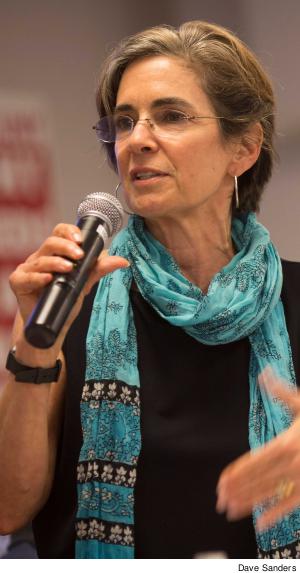
For those of us who work as higher education officers (HEOs), one of the most disappointing and infuriating moments is when we discover that we are in a “non-promotional” series. Some are permitted to apply for reclassification to a higher title, but that works for only a relatively small number whose job duties have significantly changed. In this contract we have expanded the criteria for reclassification in two ways, allowing more HEOs to be eligible for reclassification. Until now, any change in the volume of work we are assigned could not be considered when applying for reclassification to a higher title. Now it can, in recognition that the amount of work we do can transform the jobs we do.
Also, until now, many HEO Associates were ineligible for reclassification if a full HEO already worked in the same office or department. That will no longer be the case. In addition to the changes in the reclassification system, we also won a provision for a discretionary addition of $2,500 on base salary for HEOs in all but the highest title once they are on the top salary step for a year. I look forward to working with HEOs to implement these changes so that we can fully own and benefit from them.
________________________________________________
Online Teaching Observation
Felipe Pimentel
Assistant Professor
Behavioral Sciences Unit
Hostos Community College
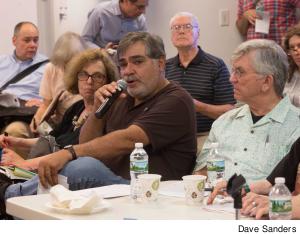
In our negotiations with CUNY, we raised important questions related to online teaching. We put together a faculty-and-staff technology advisory group, which provided the PSC bargaining team with relevant information that we used in contract negotiations. While CUNY management refused to negotiate on many questions about online teaching, they had to negotiate on the matter of “class observation” for online courses, since Article 18.1 (Professional Evaluation) requires these procedures. PSC and CUNY will create a joint committee to establish the manner in which class observations should be conducted in the online teaching environment.
This is the first step in what will be a long process of revising the contract to protect members’ rights in online teaching – a growing practice at CUNY. We still need a technology labor-management committee to address many questions that faculty and staff involved in online teaching encounter, as we cannot allow management to change teaching procedures at CUNY without a strong union voice in the process.
________________________________________________
The Fight for Fairness
Michael Spear
Assistant Professor
Department of History, Philosophy, and Social Science
Kingsborough Community College

From the very beginning of the bargaining, we were confronted with a series of demands from CUNY that demonstrated management’s desire to move in a radically different direction from the one the bargaining team felt was best for our members and the university. For example, several of CUNY’s central demands, such as allowing an unlimited number of one-year appointments for distinguished lecturers and clinical professors – who are not on tenure-track lines – were designed to increase job insecurity.
And while our goal was to raise the salaries of all faculty and staff, many of CUNY’s central demands focused on raising the salaries of a small number of faculty. The bargaining team successfully pushed back on most of CUNY’s demands and worked with CUNY on others that we felt made sense (such as a new medical separation procedure). On some of their demands we did make partial movement. Doing so put us in a better position to win some of our key demands (such as increased annual leave for librarians and multiyear appointments for adjuncts). So overall, I think the bargaining team effectively pushed back on the worst of CUNY’s demands while, at the same time, making some significant gains that will increase job security for many of our members, increase the amount of annual leave for others and create a commitment to implement a reduction in the teaching load for full-time faculty before the next contract is ratified.
________________________________________________
Nivedita Majumdar
PSC Secretary
Associate Professor
Department of English
John Jay College
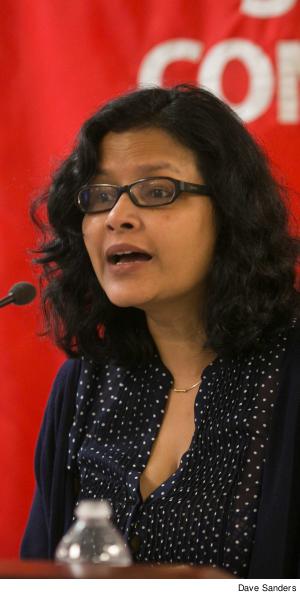
I have been in many contract campaigns, but this was the first time I was part of a bargaining team. As our excellent team negotiated everything from conceptual differences to the tiniest minutiae of policies, it was always invigorating to remember that management’s preference would be to not do any of this. They would much rather be the sole decision-makers. It was exciting to be part of a process that itself represents a victory for labor. It was also instructive to experience firsthand what I had known theoretically: Every bit of our power on the negotiating table was derived from our battle on the streets and on campuses. I’m thrilled and grateful to have worked with our deeply committed team members, led by Barbara Bowen, who, through the long process of expertly negotiating contractual intricacies, never let us lose sight of the political stakes.

